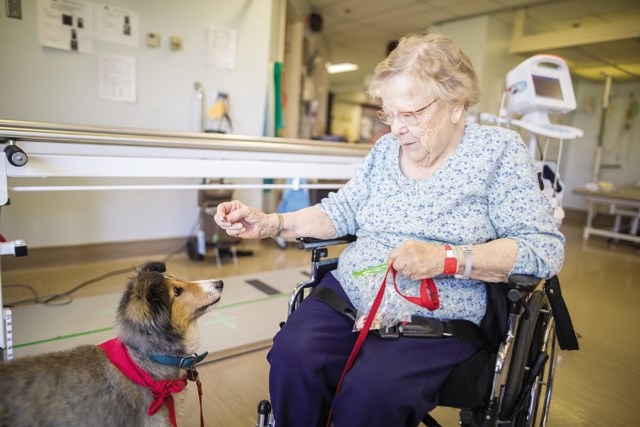An 11-year-old sheltie named Kitty Cat has the knack for melting hearts at the Oilfields General Hospital.
Residents in the hospital’s long-term care in Black Diamond immediately perk up and smile when Kitty Cat enters the room, tail wagging, for one of her visits.
“We had a resident who had multiple seizures,” said Joyce Meuring, a therapy assistant in the hospital’s physiotherapy department. “I would pick the dog up and lift her up on his bed. He would pat her and smile.”
Kitty Cat has been charming residents at the facility for four years. Former owner Bunny Munch, who has training in dog therapy, brought the multi-coloured sheltie into the hospital weekly.
“Bunny said that Kitty knew which day it was,” Meuring said. “She demanded to go out with her on Tuesdays. Now she wants to come when I leave to go to work.”
Meuring took Kitty Cat when Munch went to live at the long-term care facility in the High River Hospital.
“I always told her if something every happened, don’t worry I will look after your Kitty,” Meuring said.
Meuring grew fond of Kitty Cat during her visits to the long-term care facility the last few years.
“The dog seemed to have an innate sense of who needs extra loving,” she said. “The ones who need it she will give them a lick and lean on them a little bit. She is super gentle with frail people. She’s an angel.”
For some residents, Kitty Kat brings back memories of their own pets in days past.
“Certainly there were people, especially the farm people who are really animal orientated and the ones stuck in their wheelchairs who really enjoyed her visits,” Meuring said.
For others, Kitty Cat brought a calm into the room.
“She’s a very calm dog, very quiet,” Meuring said. “I think it calms them down, too, with anxiety. They are away from their homes and everything they know so it’s a big change for them. Some people don’t adjust as well as others. Having a nice quiet little presence there is just fabulous.”
With a busy schedule working part-time at Oilfields Hospital and feeding and caring for her horses at home, Meuring hasn’t been able to bring Kitty Cat for visits as often as she would like, but hopes to change that in the fall.
“Residents are asking where Kitty Cat is,” she said. “People at Oilfields miss her. This whole community knows this dog.”
Munch also misses the Sheltie so Meuring brought her for a visit to High River Hospital last week.
“She’s what I miss the most since being in here,” Munch said. “She is just a lovely dog.”
When Kitty Cat came into Munch’s care, Munch knew immediately she was one of a kind. Munch volunteered with therapy dogs in Calgary for more than a decade before moving to Turner Valley from the city.
“I had seen a lot of therapy dogs and I knew she would be good,” she said. “She’s probably the best one I’ve ever seen. She instinctively knows how to approach people who aren’t feeling well and she knows how to cheer them up.”
At the other end of the leash, Munch listened to story after story about dogs the residents knew before and pets they had as children.
“They nearly all had pictures on the wall of their pets and they showed the pictures to us,” she said. “It made them happy.”
Seeing first-hand the impact therapy dogs have on residents in long-term care is Charlene Porter, a recreational therapist at High River Hospital.
Therapy dogs visit the long-term care facility daily and residents make regular trips to petting zoos in the area, Porter said.
“Pets are a huge part of our program and we realize they are very valuable,” she said. “The dogs and the residents look forward to it. It’s amazing the reactions we get.”
Porter said therapy dogs are often calming for residents and bring some out of their shell.
“Some won’t reach out to grab anything but they will reach out to pet the dog. Not always, but it’s happened.”
When it comes to residents who are anxious or upset, the dogs often have an immediate affect, Porter said.
“We will have the dog sit with them and they will forget about why they are upset,” she said. “The dog will calm them down. If somebody is wandering around and can’t sit down and they’re frustrated we can divert their attention with a dog.”
Porter said the High River Hospital has a wide range of therapy dogs brought in by volunteers.
“Some are lap dogs and we’ve had Great Danes where they are the perfect height for a wheelchair,” she said. “Some people like the small dogs and some people like the big dogs. That’s why it’s nice to have a variety.”



.JPG;w=120;h=80;mode=crop)
